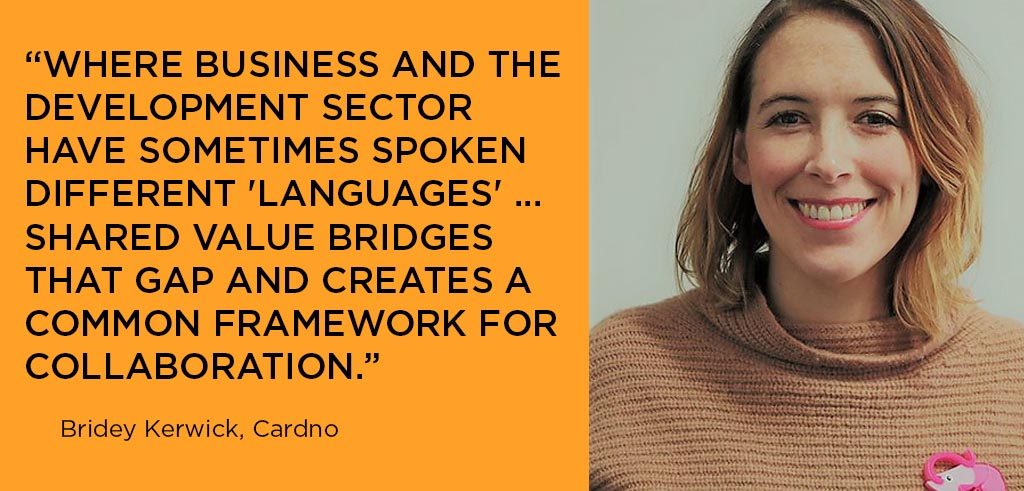What does shared value mean to you?
Shared value, for me, has fundamentally shifted the conversation about corporate social investment in a much-needed direction – towards sustainability, mutual benefit, and partnership.
What led you individually to the shared value concept? How did you come across it?
I’ve spent almost ten years of my career working across the African continent in a range of roles – including with the Flying Doctors Service and on regional donor-funded programs – and during this time, I’ve seen my fair share of public-private partnerships that have been less-than-successful in advancing sustainable development. Examples of these ‘white elephant’ projects include corporate donations of world-class medical equipment to remote medical clinics without the staff or training to operate them; and youth provided with vocational training in trades of which there is no industry demand. These programs are often well-intentioned, but unfortunately the list is long…
We know that the private sector has a substantial role to play in supporting sustainable development – the UN has emphasised this role in implementing the Sustainable Development Goals – but how to ‘get it right’ and encourage effective, appropriate and impactful private sector support has been difficult. Reflecting on the challenges that I’ve witnessed first-hand, I think shared value fundamentally shifts the existing paradigm, representing a ‘win-win’ approach where each partner brings their best assets to the table. Where business and the development sector have sometimes spoken different ‘languages’ and at cross-purposes, shared value bridges that gap and creates a common framework for collaboration.
What does shared value success look like at Cardno and where would you say you are on the journey?
There are two aspects to shared value at Cardno: our own policies and approach; and our advisory to other companies based on our social and economic development credentials. Internally at Cardno, we’re working towards embracing shared value across our own business operations – which span more than 100 countries. We’re in the early stages of our journey and starting by building an understanding of shared value across our businesses – what it is; why it is important to us; what our shared value commitments could be; and articulating a social purpose that will drive our people and our business forward.
Building on our international development expertise, we’re also supporting our public and private sector clients to embrace shared value. We’re supporting more coherent and innovative approaches to private sector engagement across government aid programs – including advocating for shared value approaches that magnify the impact of official development assistance. With our private clients – across a range of industries – we’re supporting more sustainable social investment programming based on shared value strategies, rigorous program implementation, and risk mitigation and management. This is a natural extension of our core development work, through which we have extensive experience visioning, designing, implementing and measuring the underlying projects which give a shared value approach actual impact on the ground.
What is your role individually within Cardno to support the company along its shared value journey?
I’m working in the exciting and challenging space of both spearheading shared value across the company as well as leading our Private Clients Asia Pacific consulting practice, which has a strong focus on shared value. It’s an exciting time to be driving this internal reflection and change process. We’re also focused on extending the shared value discussion more broadly, to examine shared value in emerging markets. Myanmar companies, for example, are working in shared value models that have largely been ‘unpacked’ to date – so recently we’ve captured a set of Myanmar company case studies that demonstrate how shared value is applicable and indeed impactful in the local context, emphasising that shared value is not only within the remit of large multi-nationals.
How has practicing shared value helped you individually in your role or career more generally?
Shared value is now the framework within which most of our discussions with private clients take place – and it is fundamentally transforming these conversations. From discussions spanning local content, modern slavery in supply chains, reporting against SDGs and more, shared value and the notion that ‘making business sense’ can be core to corporate social investment is producing many ‘lightbulb’ moments, followed by great enthusiasm. My sense is that shared value is continuing to gather momentum, and it’s exciting to see the idea extending into new regions and contexts.
What do you think are some pertinent issues in Australia that could be solved through creating shared value?
The establishment of a Modern Slavery Act in Australia – anticipated to be passed before the end of 2018 – will be a game-changer for Australian companies. The risks for companies of non-compliance – to reputation and social license – are high, but the rewards for thinking creatively and adopting Shared Value approaches are also significant. Given our extensive presence in the region, we’re already exploring with a number of companies how shared value approaches could be effective and transformational.
